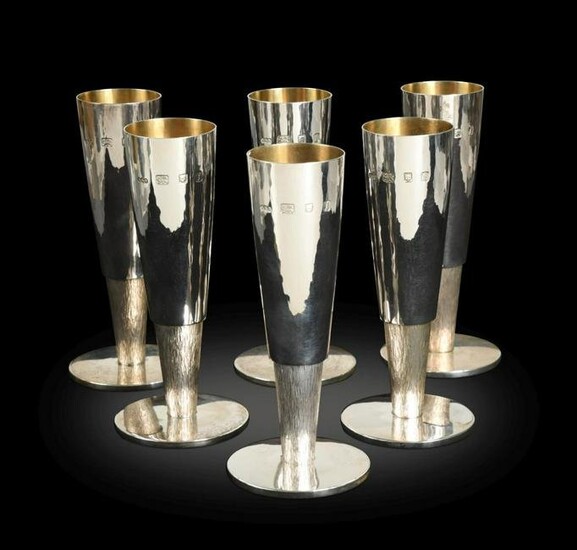§ A set of six Elizabeth II silver champagne flutes by Gerald Benney CBE (1930-2008)
§ A set of six Elizabeth II silver champagne flutes by Gerald Benney CBE (1930-2008), London, 1964, retailed by Hardy Brothers, Australia, with plain circular bases and gilt-lined bowls on cast bark pattern stems, 41.9ozt 16cm high
Unlike many artists and craftsmen, Gerald Benney did not have to wait until after his death, in 2008, to be widely regarded as one of the most renowned gold and silversmiths of the twentieth century. During his exceptional career which spanned over half a century, Benney received both critical and commercial success and was credited as the first British craftsman to simultaneously hold four royal warrants. Prized for its clean, minimalist designs influenced by modern Scandinavian aesthetics and for its characteristic ‘bark finish’, Benney’s work has remained highly sought after by both public institutions and private collectors across the world. Born into a creative family - his father a painter and his mother a silversmith - Benney spent his early years in Hull, before the family relocated to Brighton where his father became the principal of the College of Art. Between 1946 and 1948, Benney studied at his father’s college, though it was under the tutelage of Dunstan Pruden, the Roman Catholic ecclesiastical arts and crafts silversmith, that his talents truly flourished. After a two-year interruption to his studies due to national service, Benney was awarded the Prince of Wales scholarship to study at the Royal College of Art. It was during this time that Benney met fellow students and future silversmiths, David Mellor and Robert Welch. A lively social circle was quickly formed amongst the group of young silversmiths and whilst this proved fertile in the exchange of ideas and techniques, this was not reflected in Benney’s final examinations. Despite the blemishes to his academic transcript from the RCA, Benney continued to pursue his trade and was suitably rewarded with a number of notable commissions for patrons including Christie’s, the ICA and numerous Oxford and Cambridge Colleges. In the late 1950s, Benney was appointed as Consultant Designer to Viners of Sheffield, during which time he produced an enormously popular line of flatware. Celebrated both for its design credentials and its technical innovation, Benney’s mass-market wares utilised the 'no-scrap technique', which allowed Viners to produce items in great quantity with very little waste. His many significant roles included Royal Designer for Industry in 1971, a Professorship at the Royal College of Art (1974-83), the Chairmanship of the Government of India Hallmarking Survey (1981), export advisor to the Malaysian manufacturer, Selangor Pewter, and advisor to The Silver Trust. He was made a Freeman of the City of London and of the Borough of Reading and Honorary Fellow of the Royal College of Art, receiving a CBE in 1995.
Sale price
Estimate
Time, Location
Auction House
§ A set of six Elizabeth II silver champagne flutes by Gerald Benney CBE (1930-2008), London, 1964, retailed by Hardy Brothers, Australia, with plain circular bases and gilt-lined bowls on cast bark pattern stems, 41.9ozt 16cm high
Unlike many artists and craftsmen, Gerald Benney did not have to wait until after his death, in 2008, to be widely regarded as one of the most renowned gold and silversmiths of the twentieth century. During his exceptional career which spanned over half a century, Benney received both critical and commercial success and was credited as the first British craftsman to simultaneously hold four royal warrants. Prized for its clean, minimalist designs influenced by modern Scandinavian aesthetics and for its characteristic ‘bark finish’, Benney’s work has remained highly sought after by both public institutions and private collectors across the world. Born into a creative family - his father a painter and his mother a silversmith - Benney spent his early years in Hull, before the family relocated to Brighton where his father became the principal of the College of Art. Between 1946 and 1948, Benney studied at his father’s college, though it was under the tutelage of Dunstan Pruden, the Roman Catholic ecclesiastical arts and crafts silversmith, that his talents truly flourished. After a two-year interruption to his studies due to national service, Benney was awarded the Prince of Wales scholarship to study at the Royal College of Art. It was during this time that Benney met fellow students and future silversmiths, David Mellor and Robert Welch. A lively social circle was quickly formed amongst the group of young silversmiths and whilst this proved fertile in the exchange of ideas and techniques, this was not reflected in Benney’s final examinations. Despite the blemishes to his academic transcript from the RCA, Benney continued to pursue his trade and was suitably rewarded with a number of notable commissions for patrons including Christie’s, the ICA and numerous Oxford and Cambridge Colleges. In the late 1950s, Benney was appointed as Consultant Designer to Viners of Sheffield, during which time he produced an enormously popular line of flatware. Celebrated both for its design credentials and its technical innovation, Benney’s mass-market wares utilised the 'no-scrap technique', which allowed Viners to produce items in great quantity with very little waste. His many significant roles included Royal Designer for Industry in 1971, a Professorship at the Royal College of Art (1974-83), the Chairmanship of the Government of India Hallmarking Survey (1981), export advisor to the Malaysian manufacturer, Selangor Pewter, and advisor to The Silver Trust. He was made a Freeman of the City of London and of the Borough of Reading and Honorary Fellow of the Royal College of Art, receiving a CBE in 1995.



